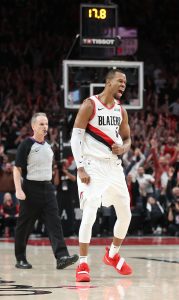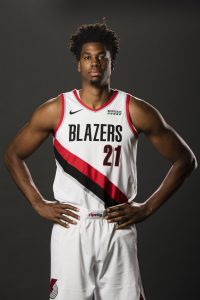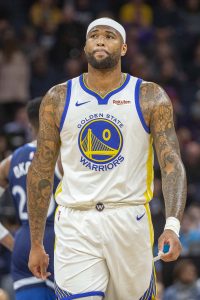Hoops Rumors is breaking down the 2019 offseason for all 30 NBA teams, revisiting the summer’s free agent signings, trades, draft picks, departures, and more. We’ll evaluate each team’s moves from the last several months and look ahead to what the 2019/20 season holds for all 30 franchises. Today, we’re focusing on the Portland Trail Blazers.
Signings:
- Standard contracts:

- Rodney Hood: Two years, $11.72MM. Second-year player option. Re-signed using taxpayer mid-level exception.
- Mario Hezonja: Two years, $3.71MM. Second-year player option. Signed using minimum salary exception.
- Pau Gasol: One year, minimum salary. Signed using minimum salary exception.
- Anthony Tolliver: One year, minimum salary. Signed using minimum salary exception.
- Two-way contracts:
- Non-guaranteed camp contracts:
Trades:
Draft picks:
Contract extensions:
- Damian Lillard: Four years, 35% maximum salary (super-max). Projected value of $196MM. Designated veteran extension. Starts in 2021/22; runs through 2024/25.
- CJ McCollum: Three years, $100MM. Starts in 2021/22; runs through 2023/24.
Departing players:
Other offseason news:
- Signed head coach Terry Stotts to a contract extension through 2021/22.
- Signed president of basketball operations Neil Olshey to a contract extension through 2024.
- Lost associate head coach David Vanterpool to Timberwolves; promoted Nate Tibbetts to associate head coach.
- Exercised 2020/21 rookie scale options on Zach Collins, Anfernee Simons.
Salary cap situation:
- Remained over the cap.
- Over the tax line by approximately $12.38MM; projected tax bill of about $22.2MM.
- Carrying approximately $145.01MM in salary.
- Two traded player exceptions available; largest TPE ($1.79MM) expires 7/8/20.
Story of the summer:
The Trail Blazers exceeded expectations in a big way in 2018/19, winning 53 games and making the Western Conference Finals after oddsmakers gave them a preseason over/under forecast of 42.5 wins.
Still, while Portland’s two playoff series victories produced some memorable moments, including a Damian Lillard dagger that will show up in highlight packages for years, the team’s season eventually ended the same way it did in 2018, on the wrong end of a frustrating four-game sweep by a conference rival.
That run to the Western Conference Finals at least quieted chatter about whether Lillard and CJ McCollum have to be split up. The Blazers further quieted that speculation by signing both star guards to massive new contract extensions during the offseason, locking up McCollum through 2024 and Lillard through 2025.
Even though the Blazers were willing to double down on their backcourt duo, it still seemed as if this roster was missing the piece that would help get it over the top and get it into the NBA Finals. Unfortunately, the Portland entered the offseason projected to be a taxpaying team and lacking the resources necessary to bring back all the team’s key free agents, forcing president of basketball operations Neil Olshey to get creative.
Olshey and the front office managed to bring back Rodney Hood, but lost several other notable free agents, including Al-Farouq Aminu, Seth Curry, Jake Layman, and Enes Kanter. Needing a big man to replace Kanter and injured center Jusuf Nurkic in the middle, Olshey surrendered two more players from last year’s roster – Maurice Harkless and Meyers Leonard – in a trade for Hassan Whiteside.
After a few more low-cost free agent signings and trades, the Blazers had set their roster, but questions remain. Besides Lillard and McCollum, six of Portland’s next eight most-used players from last year’s team are gone, and one of the two that’s still around – Nurkic – probably won’t play until sometime in 2020. In addition to to all that roster turnover, the Blazers sacrificed much of their depth on their wing when they lost Aminu, Curry, Harkless, Layman, and Evan Turner.
The Blazers have a strong culture and may be evolving into one of those teams like San Antonio that becomes perennially underrated. But at this point, this year’s squad doesn’t look like an upgrade over last year’s.
Read more
Key offseason losses:
Aminu and Harkless rarely filled up the box score, and Harkless in particular was inconsistent in 2018/19, making just 27.5% of his three-point attempts. But both veteran forwards were strong defenders who fit pretty well alongside Lillard and McCollum because they didn’t need the ball to be effective. The Blazers won’t have as many players who fit that bill in 2019/20.
While Curry and Layman weren’t as versatile defensively as Aminu and Harkless, Curry was among the NBA’s most accurate three-point shooters last season, knocking down 45.0% of his tries from beyond the arc, a mark that wasn’t far off from his career rate of 43.8%. Portland will miss his shooting.
Layman’s 32.6% three-point rate wasn’t in the same ballpark as Curry’s, but he was improving from outside and emerging as a potential stretch four. Despite his restricted free agent status, the Blazers ended up letting him go for essentially nothing, since re-signing him would have cost the organization exponentially more in tax penalties.
The Blazers opted to move on from Turner, who served as the backup point guard last season, because they felt that Anfernee Simons was ready to take on a larger role. Assuming they’re right about Simons, acquiring a wing (Kent Bazemore) in exchange for Turner was a savvy move.
Finally, the frontcourt duo of Kanter and Leonard performed pretty well after Nurkic broke his leg last season, but relying on them for a full season might have been unsustainable. The Blazers reportedly tried to bring Kanter back with their taxpayer mid-level exception but ultimately used that MLE on Hood when they didn’t get an answer from Kanter right away.
Key offseason additions:
 Whiteside was an interesting addition for the Blazers, who view the big man as the sort of rebounder and rim protector who will help stabilize the frontcourt until Nurkic returns.
Whiteside was an interesting addition for the Blazers, who view the big man as the sort of rebounder and rim protector who will help stabilize the frontcourt until Nurkic returns.
Whiteside expressed displeasure with his dwindling role in Miami more than once and has faced some questions about his effort level over the years, but the Blazers showed by trading for him that they were willing to bet on their culture – and perhaps on a contract-year bump for Whiteside – by acquiring his pricey expiring contract.
The Blazers took another another distressed asset on an expiring contract when they landed Bazemore in a deal with the Hawks. Once considered a strong three-and-D contributor, Bazemore had a down year in Atlanta and admitted to being frustrated by being caught in the midst of a rebuild there. If he’s rejuvenated in Portland, he could become a crucial piece for the Blazers, who badly need forwards who can space the floor and guard opposing scorers.
Mario Hezonja, Anthony Tolliver, and Pau Gasol all signed minimum-salary contracts, which the Blazers will hope they can outperform. Hezonja and Tolliver, in particular, look like candidates for regular minutes off the bench — anything Portland gets out of the injury-plagued Gasol might be a bonus.
A former No. 5 overall pick, Hezonja is still just 24 years old, so maybe Portland believes he still has untapped potential, but he didn’t show a lot in Orlando and New York during his first four NBA seasons. Tolliver, a stretch four who can hold his own on defense, should be a more consistent contributor, though he’s in his age-34 season and will lose a step soon, if he hasn’t already.
Finally, the Blazers believe they got a steal when they draft Nassir Little 25th overall in June. A former five-star recruit, Little was up and down during his freshman year at UNC, but could develop into a versatile multi-positional defender at the NBA level. His 77.0% free-throw rate also suggests that there’s room for improvement on his three-point shot.
Outlook for 2019/20:
I’m not a big believer in Whiteside, and I think the Blazers will miss role players like Aminu, Harkless, and Curry. Having said that, I have enough faith in Lillard, McCollum, and head coach Terry Stotts that I have a pretty hard time imagining Portland falling out of the playoff picture, even in a competitive Western Conference.
Still, the roster as currently constructed has limited upside unless young players like Collins and/or Simons take massive steps forward. With big expiring contracts on hand, along with a few intriguing prospects and all their future first-round picks, the Blazers have the ammo to make a major in-season addition.
If Olshey and the front office stand pat, I’d be surprised to see the club make another deep playoff run next spring, but at least in that scenario, those big expiring contracts would allow the team to revamp its supporting cast next summer.
Salary information from Basketball Insiders was used in the creation of this post. Photos courtesy of USA Today Sports Images.

 Whiteside was an interesting addition for the Blazers, who view the big man as the sort of rebounder and rim protector who will help stabilize the frontcourt until Nurkic returns.
Whiteside was an interesting addition for the Blazers, who view the big man as the sort of rebounder and rim protector who will help stabilize the frontcourt until Nurkic returns.